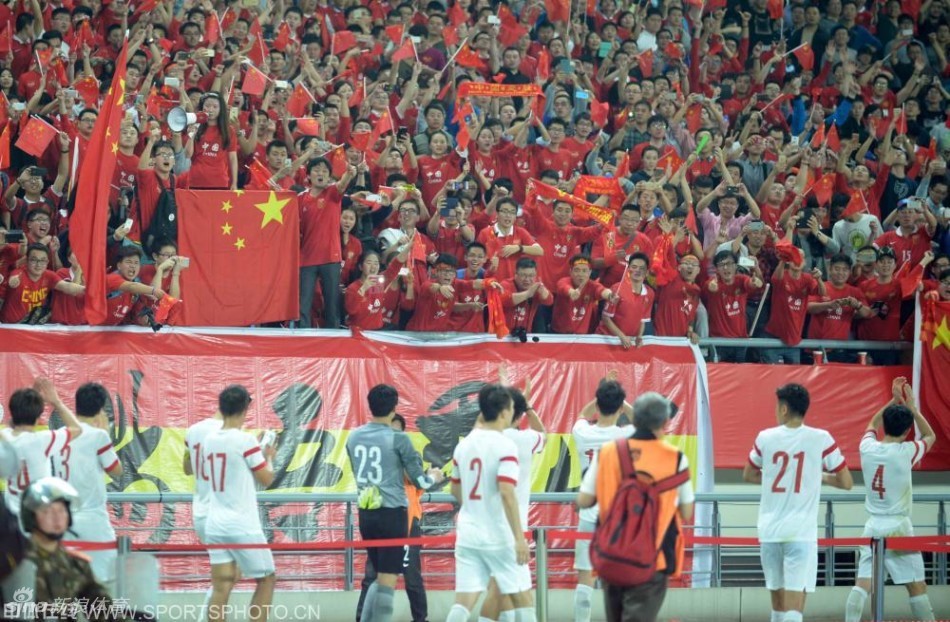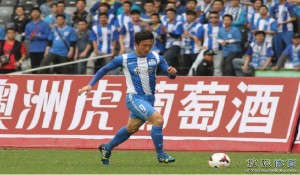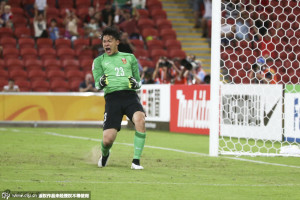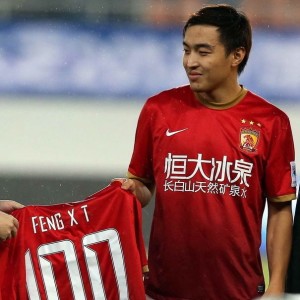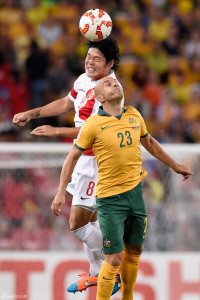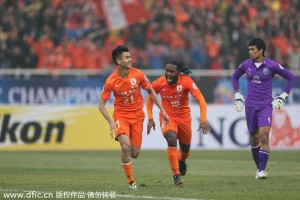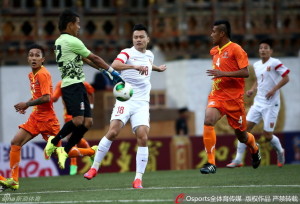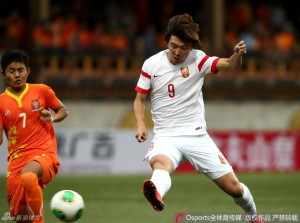The Men’s EAFF East Asian Cup kicks-off in two days and after yesterday’s competition preview, we take a closer look at China’s 23-man squad – including who’s in, who’s likely play and the talking points surrounding each position.
There were few surprises when China manager Alain Perrin’s East Asian Cup squad was first announced, with most of his regular choices being named in the 23-man list. Initially, there were two notable absentees in the shape of the Zhang Chengdong, whose recent move to Rayo Vallecano makes him unavailable as a European based player, and Zhang Linpeng, who is still on the treatment table as part of his injury blighted season.
Since then, however, four Guangzhou based players have dropped out of the squad, with Evergrande’s Mei Fang, Zou Zheng and Yu Hanchao joining R&F’s Jiang Zhipeng in the departures lounge. The withdrawals demonstrate the obvious pitfalls of holding an international mini-tournament just as the CSL is getting to the business end of things, with clubs reluctant to let tired or banged up players participate. It’s also perhaps no coincidence that Evergrande recently supplemented their already hectic schedule with a meaningless midweek friendly against Bayern Munich.
Their replacements – Rao Weihui, Lei Tenglong, Wang Tong and Zhang Chiming – have just three caps between them, giving the squad a more experimental feel than it previously had. Based on his initial selection, however, it’s clear that Perrin is looking to field a strong side rather than simply focus on development.
Goalkeepers: Wang Dalei (Shandong Luneng), Yan Junling (Shanghai SIPG), Zeng Cheng (Guangzhou Evergrande)
If bookmakers took bets on which three goalkeepers would be named in any of Perrin’s squads, you’d be a fool to put money on anything other than this trifecta. Wang Dalei and Zeng Cheng have long been givens as national team inclusions, and Yan Junling has done more than enough over the last year to prove that he is worthy of a place in the squad.
Although Yan was handed his first competitive cap in China’s most recent game, a World Cup qualifier in Bhutan, that was most likely done on the premise that it would be a good way for the 24-year-old to gain experience in a match China were bound to win anyway. Just as it was in January’s Asian Cup, the real battle for the starter’s shirt is between Wang and Zeng.
In Australia, it was Wang who got the nod and he didn’t disappoint. The former Shanghai Shenhua standout saved a penalty in the opening game and went on to, arguably, be China’s player of the tournament as Zeng watched from the sidelines.
A lot has changed since then, though, with Wang having some very shaky early season performances for club and country. His maverick style seemed to make him subject to serious errors caused by either over confidence, as was the case in a friendly against Haiti, or sloppy technique.
Contrary to Wang’s penchant for flashy saves and flashy mistakes, Zeng has been a picture of consistency since returning from a horrific facial injury which put him out for much of the early part of the season. Wang, though, has made somewhat of a return to form over the summer and so Perrin has a dilemma on his hands as to who takes the field in the opener against South Korea.
Although, seeing Yan in the Chinese goal shouldn’t be completely ruled out.
Defenders: Feng Xiaoting (Guangzhou Evergrande), Ji Xiang, Ren Hang (both Jiangsu Sainty), Yu Yang (Guangzhou R&F), Rao Weihui (Guizhou Renhe), Wang Tong (Shandong Luneng), Lei Tenglong (Beijing Guo’an)
The absences of Zhang Linpeng and Zhang Chengdong already made China’s defence very light on depth, and the subsequent withdrawals of Mei Fang, Jiang Zhipeng and Zou Zheng only making the problem worse. Mei was almost a guaranteed starter at centre back and, despite patchy domestic form this season, Jiang would likely have been first choice left-back
As it stands, it really is difficult to cobble together a reliable looking back line, with Feng Xiaoting likely to continue his international rehabilitation as the cornerstone of an otherwise inexperienced back four. Feng has made his way back into Perrin’s plans after being surprisingly cut from the Asian Cup squad and will be looking to reassert himself as a regular on the international scene.
Perrin favourite Ren Hang is also pretty much guaranteed to start, but Jiang Zhipeng’s withdrawal from the squad means his position is up in the air. Ren plays left-back for Jiangsu, but Perrin has generally preferred to use him in the centre of defence. In Jiang’s absence, however, the only other viable left-back is Rao Weihui and the Frenchman may not trust the internationally inexperienced Guizhou Renhe player to fill that role from the start.
Should Ren be shifted wide, Feng’s centre back partner will be either Yu Yang, Lei Tenglong or Wang Tong. Yu’s seven caps make him the more experienced of the trio, and he’s the only one that was called into the original squad, but he also can’t get a regular spot in the starting line-up of struggling Guangzhou R&F.
Neither Lei nor Wang have been capped at senior level, and this tournament gives them a rare opportunity to gain some international experience. Since moving back to Beijing Guo’an from Portugal last summer, Lei has not been a first choice centre back, but has still seen a lot of playing time thanks to his club’s aging and injury ravaged back line.
22-year-old Wang often plays centre back for the under-23 national team, although he usually features at right back for Shandong Luneng. That position, though, looks to be sown up by Ji Xiang who, in the absence of Zhang Linpeng and Zhang Chengdong, is a logical first choice in the role. It’s worth noting that versatile midfielder Liu Jianye can provide defensive cover if absolutely necessary.
Midfielders: Cai Huikang, Wu Lei, Yu Hai (all Shanghai SIPG), Liu Binbin, Wang Yongpo (both Shandong Luneng), Liu Jianye, Sun Ke, Wu Xi (all Jiangsu Sainty), Yu Dabao, Zhang Chiming (both Beijing Guo’an), Zheng Zhi (Guangzhou Evergrande)
With Sun Ke and Yu Hai back after missing the June World Cup qualifier through injury, China’s only midfield absentee is Yu Hanchao. With the team very likely to play a 4-2-3-1, veteran captain Zheng Zhi is certain to take one of the defensive midfield roles providing his 34-year-old body is fit enough to play the whole tournament.
Zheng is usually accompanied by either Cai Huikang or Wu Xi. Cai is an out and out spoiler who offers little going forward, but protects the defence by breaking up opposition attacks. Wu is more of a box to box midfielder who, when on form as he was in the Asian Cup against Uzbekistan, can really drive the Chinese midfield.
It’s perhaps a slight over simplification, but should Perrin wish to take a more conservative approach he will select Cai and if he wants more going forward he will select Wu. Liu Jianye can also play this role, but with his continuing inclusion in Perrin’s squads without ever actually playing, only injuries or suspensions are likely to allow the veteran to take the field.
The attacking midfield is China’s strongest outfield position in terms of depth, with a versatile group of players offering Perrin numerous options. The one player who seems certain to start is Wu Lei and he will feature on the right wing or in behind the striker. Wu is probably China’s most talented attacking player but he can be inconsistent for club and, particularly, country and has often been wasteful in front of goal at international level.
Should Wu Lei play on the wing then Wang Yongpo would seem like an obvious choice to play in the middle of the three. The 28-year-old has been in excellent form playing in that role for Shandong Luneng this season and this is the first time he has been called up by Perrin since the Frenchman’s maiden game in charge – a 3-1 Asian Cup qualifying defeat to Iraq last March.
Indeed, Wang is the only player in the squad who hasn’t already been called up to the national team at least once in 2015 and it will be interesting to see if he can immediately earn a starting birth. If he doesn’t, and Perrin still wishes to keep Wu Lei on the wing, Wu Xi offers another alternative. Wu lacks the creativity of Wang or the attacking spark of Wu Lei, but he has a strong engine and will offer more defensive cover from the position.
Given his three goal haul at the Asian Cup, Sun Ke seems an obvious choice to play on one of the wings, but injury and his on again off again transfer to Tianjin TEDA have somewhat disrupted his season.
With four goals in China’s last three games, Yu Dabao has forced his way back into the international reckoning, but all of those strikes came as a substitute, suggesting that he is not a favourite of Perrin’s and may still have to settle for a place on the bench.
Yu Hai, who already has 55 caps to his name, has been in great form for CSL leaders Shanghai SIPG this season, giving him a strong case for a starting role on the left-wing where lightening quick youngster Liu Binbin will also be hoping to play. Liu has been in and out of Shandong Luneng’s starting line-up this season, but he’s still managed four goals and six assists and is an exciting player who could do with more international experience.
There was a lot of hype surrounding Zhang Chiming back in March when he scored a goal for Chongqing Lifan against Guangzhou Evergrande, celebrated with his shirt off and got his first call up to the national team. Substitute appearances in friendlies against Haiti and Tunisia showed his potential to make electrifying runs at defenders but also demonstrated a lack of end product.
Between then and the end of June, an output of just one assist in thirteen CSL appearances highlighted Zhang’s lack of a final ball, although he still earned a move to Beijing Guo’an where his playing time is likely to be limited. The fact that Zhang was only called up as late replacement for Yu Hanchao suggests we may not see much of him in Wuhan
Ji Xiang has occasionally appeared on the wing under Perrin in a more defensive capacity, but given the lack of cover at right-back and the plethora of more dangerous option available, he’s unlikely to reprise the role next week.
Forwards: Gao Lin (Guangzhou Evergrande), Yang Xu (Shandong Luneng)
For the first time in a long while, China has two strikers that have not only playing up top for their CSL clubs but have been in very good form while doing so. With pretty much every Super League team playing with one up front and fielding foreign players in the role, opportunities for Chinese strikers are sparse, but this year both Gao Lin and Yang Xu have grabbed their chances with both hands.
At Guangzhou Evergande, Gao was moved inside from his usual spot on the wing thanks to injuries to Elkeson and Alan and he has managed an impressive twelve goals this season to make him the CSL’s third highest scorer. A moment of madness when he threw his shoes at a Liaoning Whowin fan who had been heckling him on his way to the team bus led to a five game CSL ban, but that doesn’t take away what Gao has achieved on the pitch this season.
Yang Xu has not been nearly as prolific as Gao in the CSL, but his five league goals are supplemented by six strikes in just five appearances in the AFC Champions’ League group stages. Last season, the 27-year-old was out of favour with Shandon Luneng manager Cuca and was shipped out on loan to Changchun Yatai for the second half of the year.
However, after regaining his place in the squad, Yang took advantage of an early season injury to Luneng’s new signing Diego Tardelli to stake his claim as the central striker. The Brazilian international has since returned to fitness, but now features on the left of an attacking three with Yang through the middle and CSL top scorer Aloisio on the right.
Trying to decide between two in form strikers is a nice problem for Perrin to have and, based on Super League output, it looks as though Gao ought to get the nod. But on the international stage, Yang has a far better strike rate. His hat-trick against Bhutan means Yang is now just one goal behind Gao’s 18 career international strikes despite the fact that he has played 46 games less than him.
Indeed, Gao is averaging less than one goal in every four of his 83 international appearances, which is a startlingly poor return. It is worth noting, though, that many of those appearances have been on the wing.
Under Perrin, Yang has scored six in twelve appearances, while Gao has managed just two in fourteen. Tellingly, though, neither of them managed to find the net during the Asian Cup and a major knock on Yang’s international strike rate is that the vast majority of his goals have come against weak opposition.
Perrin played both together against Bhutan, but is highly unlikely to leave himself a man short in midfield against the superior caliber opponents in the East Asian Cup. Other options available to the Frenchman are to play Yu Hai up top or Wu Lei as a false nine like he did for periods in the Asian Cup. Yu Dabao can also play centre forward, but he hasn’t done so for a long time and none of these options make much sense given the recent form that Yang and Gao have been in.
It should be noted that Yang has been struggling for fitness since picking up an injury in Sahndon’gs most recent CSL, and that may influence Perrin’s selection. Whoever gets the nod – and given Perrin’s habit of changing things up they are both likely to get some playing time – will have an opportunity to enhance their reputation against relatively strong opponents and continue to prove that the decent Chinese striker is not completely extinct.
